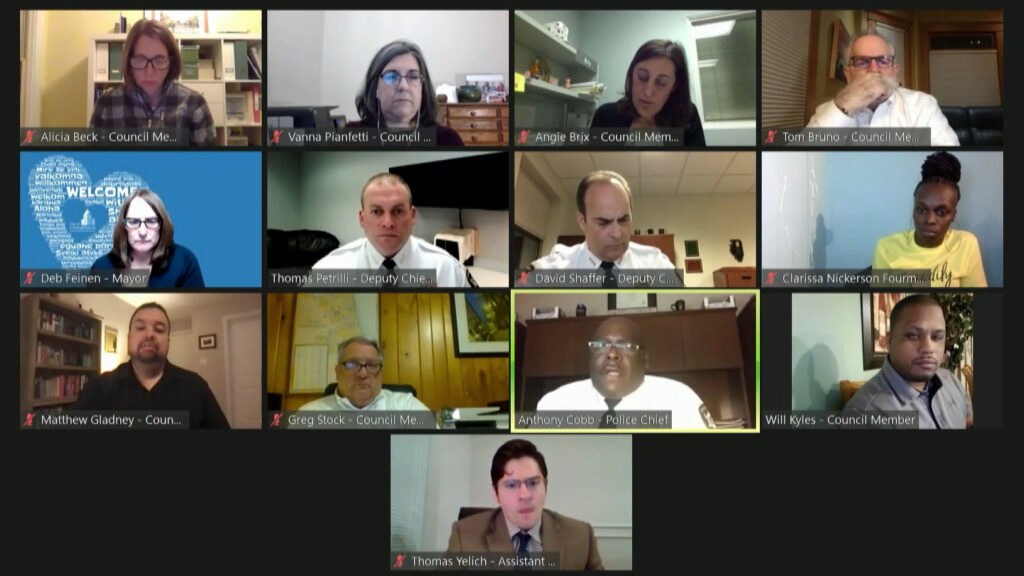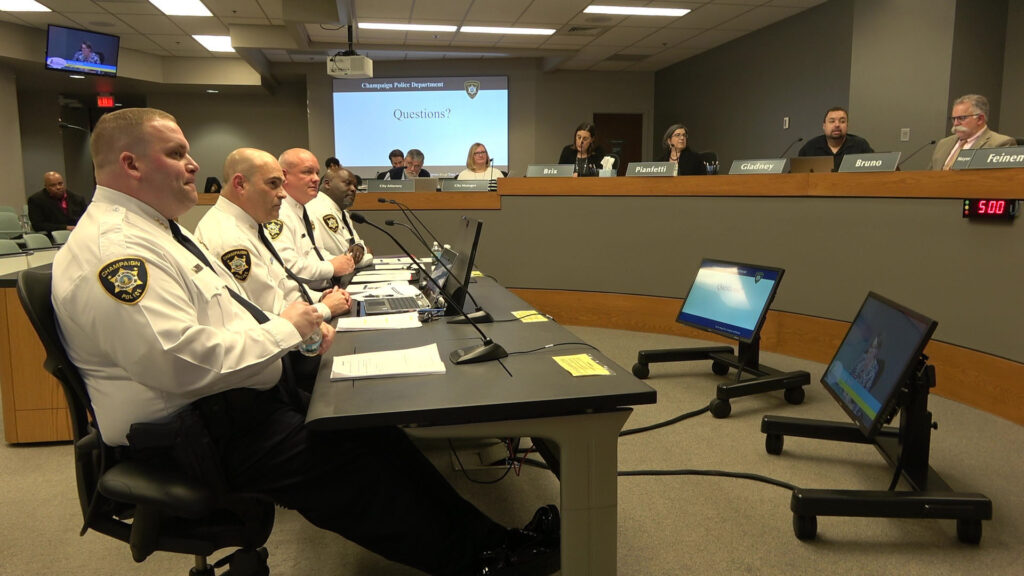
On February 9th the Champaign City Council convened with just one agenda item: the “Champaign Police Department Update”. The official update was provided as an 86 page document which ranged in content from policing history, to pending state legislation, to recent community listening sessions.
Chief Anthony Cobb was present at the meeting but the report was delivered by Deputy Chief Thomas Petrilli and Cobb has his personal public relations steward Tom Yelich on standby to help with answering questions. By and large, the public was not convinced that the Champaign Police Department (CPD) was presenting completely and honestly.
This year’s CPD presentation seemed to take the same approach as a very similar presentation made on March 10th of 2020: focus on how people perceive the police rather than on the quality and outcome of their service. It would seem that the police are not entirely willing to consider that it may be their own history of actions that has caused community distrust, and instead prefer to see modern-day policing simply as a marketing or public relations problem. The 2020 presentation focused very explicitly on improving “image”, whereas the 2021 presentation did essentially the same, but was perhaps more nuanced.

A summary of comments from members of the public who attended the February 9th presentation:
Brian Dunn criticized the CPD on their brief and evasive mention of the police killing of Kiwane Carrington, and a failure to fully acknowledge racial disparities in policing. Dunn also noted that the police community listening sessions always had police officers present, but any input taken from the police officers themselves was done in private sessions closed from public view.
Allan Axelrod pointed out that the CPD report seems to be missing the input and experiences of those most affected by the justice system, such as recently incarcerated individuals. He also noted the connection between homelessness and the criminal justice system and implored City leadership to make efforts to approach these individuals for input.
Alexandra Harmon-Threat, the new Chair for Champaign’s Citizen Review Subcommittee (CRS) for police complaints, also delivered criticism. Harmon-Threat had attended a several of the community listening sessions, and said that a number of community statements and suggestions were missing from the report. She further noted that “a lot of this seems focused on optics, not on outcome, and we really need to be thinking not about looking good, but about reducing crime and reducing inequity in the justice system.”
Harmon-Threat pointed out that some types of police training programs do not actually improve outcomes, and that having more police presence can sometimes increase trauma. She also expressed great concern with the tactics that the CPD employs in regards to police complaints, noting that “complaints are often lost, not filed, or not followed up on” and urged the City to increase transparency in the complaint process. “There has to be a better way to track and report on these complaints.”
Harmon-Threat also raised the issue of the 30 day time limit for filing police complaints. She said that the CRS has been asking the Police Department to eliminate the time constraint for the past two years. The CPD did extend the complaint filing time to 60 days, but Harmon-Threat said it was still “very insufficient” given that a victim of police misconduct may experience debilitating trauma for a very long period of time. She noted that while Chief Cobb slightly increased the time for filing a complaint, at the same time he substantially increased the amount of time (to six months) that CPD has to respond to a complaint. “This seems an inequity that really needs to be remedied.”
Harmon-Threat echoed comments spoken by Council member Clarissa Nickerson Fourman about the need to simply decrease police-community interactions, noting that excessive interactions by police with people of color creates mistrust. She argued instead for non-police intervention for minor infractions and closed by saying that “we need to think about community solutions rather than police solutions.”
The full video of the February 9th Champaign City Council meeting can be viewed here.
Correction: the original version of article mistakenly attributed the commentary of Brian Dunn to a different speaker. The article has been updated to reflect the correct name.

On the plus side, the innovative ‘customer’ opinion survey described in the chief’s presentation is in no way required by the bill sitting on the Governor’s desk at the time. In good keeping, an encounter which results in arrest becomes a valid data point. Since the aim of the opinion survey is to gather immediate feedback for purpose of improving officer service delivery quality, the jailer could give detainees access to the survey immediately after fingerprinting.